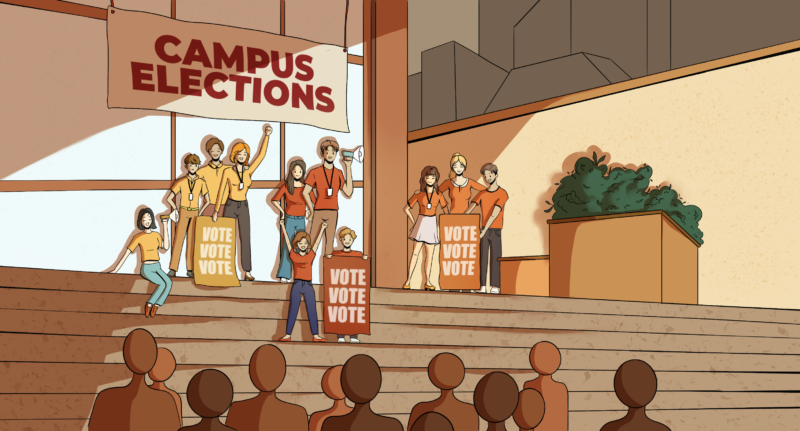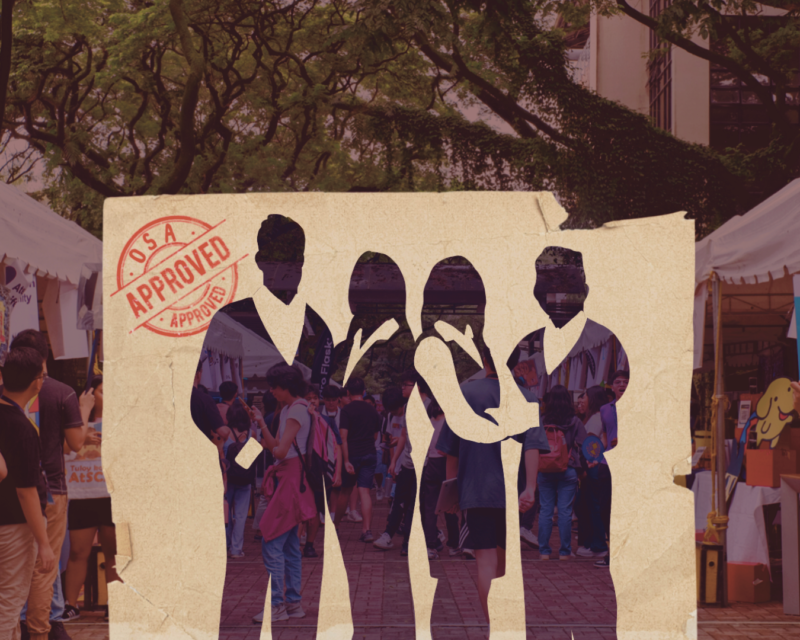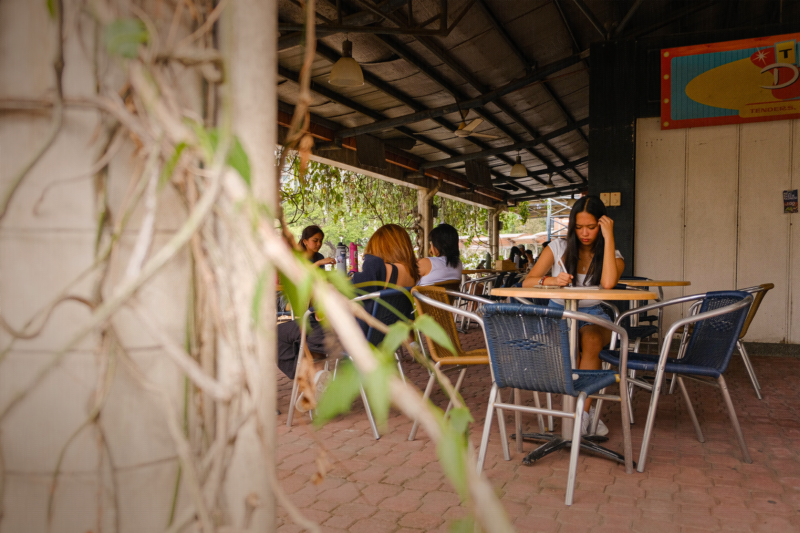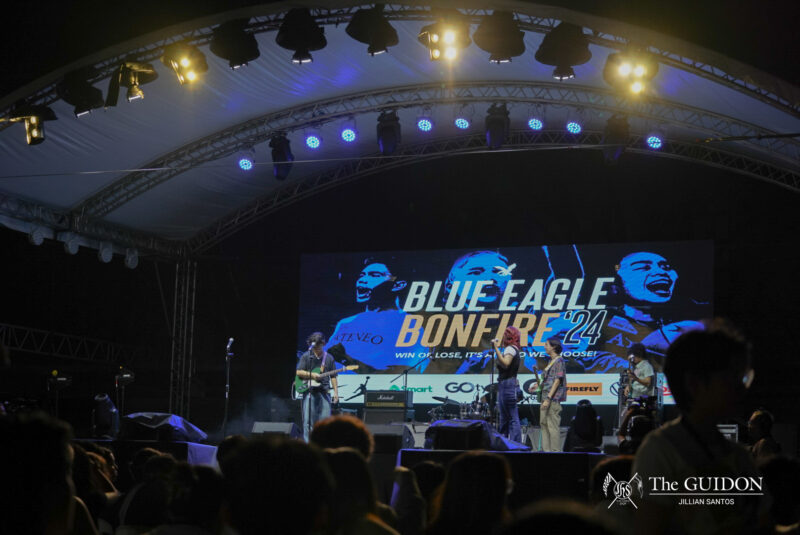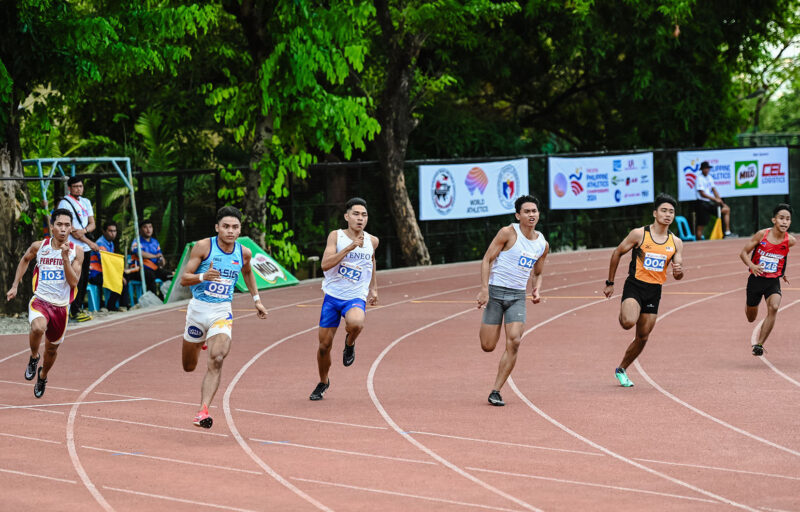UNDERNEATH THE matching exterior of blue lanyards, polyester jerseys, and swooping Eagle mascots of about 8,000 Loyola School (LS) students is a wide spectrum of political colors. As these students take part in perhaps the most important national elections of their lifetime, the contrast among these colors beam brighter than ever.
Students’ political leanings are informed by a myriad of factors, but their personal values and identities play a great role in forming their political agenda. While it is only natural for students to make a great show of support towards candidates who represent their ideals, they run the risk of being exclusionary towards those with dissenting values.
A broad spectrum
Some members of the LS community have shown support for Vice President Leni Robredo, among the 2022 presidentiables. Nevertheless, the pink-wearing crowd is but one of numerous colors that members of the LS community sport.
Red Ligot (4 BS MIS – MS CS) is one of those in the LS who supports presidential aspirant and labor leader Leodegario “Ka Leody” de Guzman. Ligot finds that the openly-socialist candidate’s pro-worker agenda is a reflection of his own political views.
Coming of age during the Duterte administration, Ligot found himself shaken by the spate of unjust killings during the war on drugs. From then on, he started following the footsteps of his parents, who were political activists in the 90s. The sight of workers protesting in his own school further deepened his devotion to fight for the underprivileged.
Like his candidate, Ligot began spending much of his time championing human rights. However, he is somewhat encumbered by the need to defend his candidate from harsh criticism online. Ligot himself is no stranger to political mudslinging, as he and his colleagues oftentimes become targets of name-calling by individual members of rival leftist factions.
Thankfully, Ligot attests that this atmosphere of vitriol has not yet permeated the LS community, as students are generally non-confrontational when it comes to politics.
Despite this harmony, he still feels the need to be cautious when engaging in political debates with fellow Ateneans. He claims that many Robredo supporters espousing an upper-middle class identity in the LS doubt the working class de Guzman’s capability to be president.
Friend or foe?
The class-motivated pressure that Ligot feels is experienced by many. Today, people often decide and defend their political agendas based on their identity in a phenomenon also known as identity politics. This refers to how one’s class, race, religion, gender, culture, or other aspects of their identity may affect their political tendencies.
Identity has always played a role in politics, even in the Philippines. A recent example of this is the 2016 victory of President Rodrigo Duterte. His image as an “ordinary man” appealed to many Filipinos, who similarly identified as commonplace.
Considering how widespread identity politics is in the country, Political Science Professor Arjan Aguirre, MA, warns about its “irony” in which people blindly follow what their identity dictates. For example, a person may choose to vote for a candidate under the sole assumption that the candidate shares strong similarities with the voter and can thus embody their best interests.
The rise of identity politics has unfortunately led to increasing threats of polarization since discrimination towards a person’s views may translate to discrimination towards their identity. In turn, this instills an “us versus them” mentality among Filipinos, widening the gap between people who do not share the same beliefs and opinions.
According to Aguirre, this polarization is reinforced by what he refers to as “politics of antagonism” or “vitriolic politics,” in which tension-filled political conversations and personal attacks commonly occur between two opposing sides.
In contrast, identity politics appears to have a silver lining, as shown in how it has brought several diverse groups into the conversation. Striving for positive public recognition of their identities, it became a means for minority groups to demand for equal treatment and stand against oppressive policies and discrimination.
With this, some believe that it can still be used to create a more fair and inclusive society by increasing political awareness and understanding how identity also informs one’s politics.
For Aguirre, academic institutions such as the LS play a major role in shaping its students’ identities, which then shape their politics. “That’s what we offer to our students in our social classes, […] we help you discover who you are, for you to discover your potential,” he explains.
Eagle’s eye view
LS students’ identities are largely informed by elite values of service and magis. Beyond the classroom, students are expected to uphold these ideals in their communities—ideals that contrast the litany of state abuses committed by the Duterte regime.
Given these grave inequities, Aguirre says that LS students have branded themselves as the opposition and have tended to side with an anti-Duterte identity, which is typified in Robredo.
According to Aguirre, this is a feature of identity politics. As a result, the tension between supporters of the Duterte government and the opposition ultimately gives rise to what is known as the “politics of antagonism.”
The Ateneo Assembly Vice President of Political Education Matthew Flores supports these sentiments. Based on observations from The Ateneo Assembly’s student-led discussions, Flores suggests that participants back Robredo’s candidacy as she best embodies the Ateneo ideals of good governance and service compared to other presidential candidates.
Other prominent factors may have won their support as well. Among other things, these include her clean track record, her involvement in community building, and her host of recovery plans.
Nonetheless, Flores adds,“If you’re vocalizing your support for Leni siguro it’s about her character, but I think it’s also because Leni represents something that you identify with. So even us [LS students] are not above identity politics.”
Flores admits how it’s still natural for these students to fall down the rabbit hole of identity politics, as people often vouch for leaders who best represent themselves. However, he attests that character alone is not enough in basing one’s decision on who to support. After all, just because a candidate shares similar characteristics with a voter does not mean that the candidate is able to represent them in the best way possible.
According to Flores, most LS students may not acknowledge that they engage in identity politics. This can be because the phenomenon often appears to be grounded on superficial reasoning, lending little credence to a candidate’s policies and platforms over specific aspects of their identity.
Despite the stigma surrounding identity politics, Flores asserts that students would likely be open to admitting their engagement when confronted about the issue.
A palette of blue
As subtle as it may seem, identity politics continues to shape the political views of Ateneans–making it important to cultivate safe spaces for students to air their sentiments regarding the 2022 national elections.
As such, Aguirre mentions that a more proactive institution is crucial in engaging with students and deepening their sense of identity. One way of achieving this is through course offerings such as gender awareness curricula that promote different identities. He suggests that the University spearhead these programs soon instead of simply waiting for student demands to emerge.
Similarly, he claims that awareness of one’s identity is the first step towards building rapport.
“Do not assume that what you have, who you are, are fixed, are stable, or are the best. What you have is just a perfect mix of those things that are also found in other people. [That] understanding would lead to listening, and that could lead to being with others,” Aguirre says.


